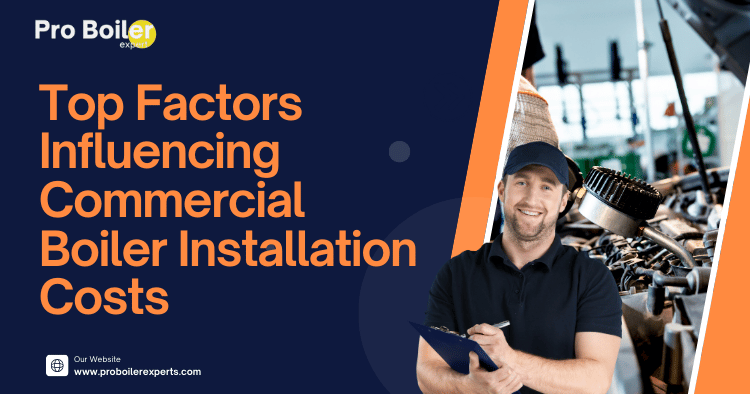Table of Contents
- Introduction
- Type of Boiler
- Size and Capacity
- Installation Complexity
- Location and Accessibility
- Local Regulations and Permits
- Labor Costs
- Additional Features and Upgrades
- FAQs
- Conclusion
Introduction
When it comes to maintaining a comfortable and efficient commercial space, the importance of a reliable boiler cannot be overstated. However, the cost of commercial boiler installation can vary significantly based on various factors. Understanding these factors can help you make informed decisions and budget accordingly. In this article, we’ll explore the top factors influencing commercial boiler installation costs, providing you with valuable insights and tips.
Type of Boiler
“Choosing the right boiler is not just about cost; it’s about finding the best fit for your specific needs.”
The type of boiler you choose plays a critical role in determining installation costs. Commercial boilers come in various types, each with distinct features and price points.
- Fire-Tube vs. Water-Tube: Fire-tube boilers are generally less expensive to install but may not be suitable for all applications. Water-tube boilers can handle higher pressures and are often more efficient but come with a higher initial cost.
- Condensing vs. Non-Condensing: Condensing boilers are designed to recover and reuse heat, making them more energy-efficient. However, they can be pricier upfront compared to their non-condensing counterparts. For more information on different boiler types, see our article on Top 5 Boiler Types: Find Best Fit for Home.
Size and Capacity
“A well-sized boiler is key to efficiency—too big or too small can cost you.”
Determining the appropriate size and capacity for your boiler is essential for both performance and cost-effectiveness. A boiler that is too small will struggle to meet your heating demands, while an oversized unit can lead to unnecessary energy consumption and increased installation costs.
- BTU Rating: The British Thermal Unit (BTU) rating is a key factor in sizing your boiler. As a general rule, for commercial spaces, you should consider about 30 to 60 BTUs per square foot.
- Load Calculations: Conducting a load calculation can help ensure you choose the right size. This involves assessing your building’s insulation, heating requirements, and other factors.
| Commercial Space Size (sq ft) | Estimated BTUs Required |
|---|---|
| 1,000 – 1,500 | 30,000 – 90,000 |
| 1,500 – 2,500 | 90,000 – 150,000 |
| 2,500 – 5,000 | 150,000 – 300,000 |
Installation Complexity
“The easier the installation, the lower the costs—keep it simple!”
The complexity of the installation process can significantly impact your overall costs. Factors that contribute to installation complexity include:
- Existing Infrastructure: If you’re replacing an older boiler, the condition of existing piping and ventilation systems may require modifications, adding to costs.
- Type of Installation: A straightforward installation will be less costly than one that requires extensive renovations or upgrades to your building’s systems. For tips on installation, you may find our guide on Installation Day: What to Expect for Your New Boiler helpful.
Location and Accessibility
“Accessibility matters—where you are can affect how much you pay.”
The location of your commercial property can also influence installation costs. Factors include:
- Accessibility for Equipment: If your site is difficult to access, it may require additional labor or specialized equipment to complete the installation.
- Geographic Location: Costs vary by region. Urban areas often have higher labor rates compared to rural locales.
Understanding local challenges and opportunities can help you plan more effectively for installation.
Local Regulations and Permits
“Stay compliant to avoid unexpected costs; regulations can add up.”
Before installing a commercial boiler, you’ll need to familiarize yourself with local regulations and permit requirements. Compliance can involve:
- Building Codes: Ensuring that your installation meets local building codes can incur additional costs, especially if upgrades or inspections are necessary.
- Environmental Regulations: Some areas have strict emissions standards that may require more expensive, eco-friendly equipment. For a comprehensive look at regulations, see our article on Essential Building Regulations for Boiler Installations 2024.
Consult with local authorities or a licensed contractor to navigate these requirements effectively.
Labor Costs
“Quality labor isn’t cheap, but it’s worth the investment.”
Labor costs can significantly impact your installation budget. Factors contributing to labor costs include:
- Experience Level: Skilled technicians with extensive experience may charge more but can ensure a higher quality installation.
- Project Duration: The more complex the installation, the longer it may take, leading to higher labor costs.
Getting multiple quotes can help you find a balance between cost and quality. If you’re looking for tips on choosing a professional, check out our guide on Top 5 Tips for Choosing the Right Boiler Installer.
Additional Features and Upgrades
“Investing in upgrades can pay off in the long run—think beyond just the initial cost.”
Sometimes, you may want to invest in additional features or upgrades that can enhance your boiler’s efficiency and functionality. These may include:
- Smart Controls: Modern thermostats and control systems can optimize energy usage, though they come with a higher upfront cost.
- Water Treatment Systems: Adding a water treatment system can help prolong the life of your boiler, reducing long-term maintenance costs.
While these features may increase your initial investment, they can lead to significant savings over time. For insights on energy-efficient options, consider our article on Top 5 Energy Efficient Heating Systems for Your Home.
FAQs
“Knowledge is power—get informed to make better decisions.”
What is the average cost of commercial boiler installation?
The average cost can range from $10,000 to $50,000 or more, depending on the factors discussed.
How long does installation take?
Installation typically takes between 1 to 5 days, depending on the complexity and size of the project.
Can I install a boiler myself?
While DIY installations may save money, commercial boiler installations require professional expertise to ensure safety and compliance with regulations.
Conclusion
Understanding the various factors that influence commercial boiler installation costs is crucial for making informed decisions. By considering the type of boiler, size and capacity, installation complexity, location, regulations, labor costs, and potential upgrades, you can effectively manage your budget and ensure a successful installation. For more detailed information, consult with professionals or refer to authoritative resources, like The U.S. Department of Energy or local building authorities. Happy heating!





